WHY SHOULD THE STOCK MARKET DROP?
Maybe it’s just an ego problem
Problem is I’ve been fooled before
By fair weathered friends and faint hearted lovers
And every time it happens
It just convinces me more
-Dr. Hook “When You’re in Love with a Beautiful Woman”
We are continuously told that the stock market is overvalued and due for a huge fall. “Economic fundamentals stink”, “the stock market is irrational”, “the US dollar is worthless”, “the mortgage foreclosure scandal is the next shoe to drop”; basically- “it’s the end of the world as we know it” (sorry for all the music references!).
We hear these ‘experts’ spouting these mantras all the time and yet the market moves up? My question to all these doomsayers is why? Why does the stock market need to crash? Was it ‘rational’ 18 months ago when the market had lost 60% of its value? Why should that be the correct level for the stock market?
Disconnect
While many investors believe that stocks price act in unison with economic performance, the fact is that in many instances, there is little relation between the two. According to the highly regarded CXO Advisory Group, “evidence from simple tests offers little support for a belief that monthly or quarterly changes in U.S. employment usefully predict intermediate-term U.S. stock market returns. Over longer intervals, the relationship appears to be inverse.”
The recent global recession, while painful for the average Joe, was a wake-up call for corporations worldwide. In order to stay afloat, many companies resorted to cutting costs and trimming unnecessary organizational fat. Anticipating a prolonged business slowdown, they were faced with the option of either massively lowering costs—which entailed huge layoffs— and trying to weather the storm or continue to be bloated and face massive losses and eventual bankruptcy.
For investors looking to invest in companies maximizing profits, now may be a potentially great time to invest. Regardless of what our aforementioned ‘experts’ say, the stock market is a gauge of current and expected corporate profits. It is not a litmus test for economic performance. Corporations have succeeded in significantly cutting expenses and are now very lean. This means that not only are they more agile and able to quickly adapt to changes in the marketplace, but when the overall economy starts improving, they are poised to post very strong profit growth. In fact, in the midst of quarterly earnings reports, we are witnessing company after company handily beating their earnings forecasts, and the companies themselves are becoming more optimistic on their own business prospects going forward. For investors looking to make money, this is the bottom line.
The End of the World
Maybe fear-mongering sells, but for investors it’s important to stay focused. The fact is that stocks are actually cheaply valued on a historical basis. Besides anticipated earnings growth, many analysts maintain that stocks are undervalued considering the huge amount of cash investors have been hoarding with $9.5 trillion in cash still on the sidelines, down by just $550 billion, or 5.5%, from a year earlier. David Kelly, chief market strategist at J.P. Morgan Funds, believes “investors are missing the best part of the day,” comparing them to teenagers who sleep in until mid-afternoon. While there are lots of problems the economy still has to solve, “the biggest thing that’s out of whack is investor attitudes.”
According to Bill Nygren, manager of the Oakmark Fund, “The most likely candidate to derail the stock market would be Washington. There’s the risk that ballooning government spending will eventually lead to significant inflation and that there’s much more of an anti-business tone to the rhetoric that we’ve had in Washington than anything since the Carter Administration.” But he doesn’t see it as a big enough problem to make investors avoid owning equities for now.
In fact, the way it’s looking, the upcoming U.S. congressional elections will be a total rebuke of the current economic policies of Washington. A reversion to more moderate policies could be a big catalyst for further stock market gains.
The information contained in this article reflects the opinion of the author and not necessarily the opinion of Portfolio Resources Group, Inc., or its affiliates.
Aaron Katsman is author of the book Retirement GPS: How to Navigate Your Way to A Secure Financial Future with Global Investing (McGraw-Hill), and is a licensed financial professional both in the United States and Israel, and helps people who open investment accounts in the United States. Securities are offered through Portfolio Resources Group, Inc. (www.prginc.net). Member FINRA, SIPC, MSRB, SIFMA. For more information, visit www.aaronkatsman.com or email aaron@lighthousecapital.co.il





